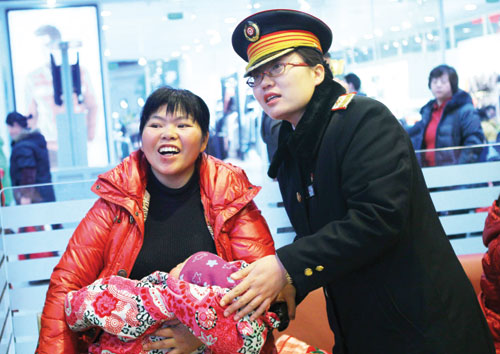Human safety net
Updated: 2013-02-07 07:37
By Zhao Yinan (China Daily)
|
|||||||||||
|
Zhang Runqiu helps a nursing mother move into a sitting area reserved for seniors, pregnant women, the physically disabled and children. |
When things go wrong for travelers, a train station patrol officer is ready to help, Zhao Yinan reports in Beijing.
When Zhang Runqiu encountered Ma Zhongmei and her husband during a regular patrol at Beijing South Railway Station, the young couple was helping their baby to breathe from an oxygen bag.
The mother, sitting on a large pile of quilts and holding the infant in her arms, was weeping quietly. Standing beside her was her husband, holding the oxygen pillow, which was connected by a transparent plastic tube to the baby.
Even to a veteran railway worker like Zhang, whose main job is assisting the disadvantaged and travelers with problems, the scene was dramatic and piercing.
The 33-year-old rushed over, bent down and asked how she could help.
The mother was too sad to talk. Her husband said they were waiting for a train to take them back to their hometown for the Spring Festival.
Zhang invited the family to a sitting area reserved for seniors, pregnant women, the physically disabled and children.
Ma tells the professional Samaritan that the 1-year-old baby had been diagnosed with lung cancer six months ago. Since then, the parents had been seeking effective treatment in Beijing, but their hope was diminishing as time passed. Recently, doctors had suggested that they go back home to share the child's last days there.
"The poor baby reminds me of my own daughter, who is 2 years old," she says, pressing one hand on her chest and recalling the lump in her throat.
"But I'm not a doctor. The only thing I could do was to offer them a seat and help the couple get onto the train earlier than other passengers, partly reducing the inconvenience of traveling for the sick baby."
Zhang borrowed a wheelchair, scooped up the mother and the baby in it, and wheeled them through the emergency passageway to the platform. In the carriage, Zhang made a phone call to the couple's destination station and asked staff there to help the couple with the luggage.
Walking around in one of China's most modern railway stations and looking for people who need help is Zhang's primary task every day.
Zhang and eight other members of Beijing South Station service team receive nearly 70 appointments by phone and on weibo, a Twitter-like service in China. The team also assists hundreds more passengers like Ma Zhongmei, who didn't book special attendance in advance but hit obstacles when they travel.
During the Spring Rush, about 95,000 passengers arrive in and leave Beijing through South Station every day.
Gao Yujie, Zhang's colleague, says railway workers who communicate directly with passengers, like Zhang, face more pressure than those working in an office.
But working at the world's third largest railway hub does not simply mean attaining happiness by reaching out to others.
Living outside the Sixth Ring Road south of Beijing, Zhang usually gets up at 5:30 am and has to transfer three times by bus and subway so she can get to the station before 7:30 am.
Over the years, she says she has been accustomed to eating breakfast while walking to the bus stop and applying her makeup on the road.
Lu Jing is part of Zhang's service team. While she's seeing off hundreds of passengers in this week's holiday rush, the 21-year-old is prepared to spend her second Lunar New Year's Eve in the station.
"My feet and legs were swollen as soon as I joined the service team - I was not accustomed to long periods of walking and standing," she says with a big smile that her colleagues say is always on her face.
"But I find delight in helping passengers, especially when passengers come back and say hello to me when they come to the station again."
Lu says she probably will go back home after the Spring Rush is over.
Commuting across the crowded capital and working long hours are not the worst part of her job. Zhang says the thing that she fears most is misunderstanding with passengers.
March 23, 2012 is a day deeply embedded in her memory. Thousands of passengers were stuck in the station because trains were canceled due to bad weather. "As the number of stranded passengers was increasing, many became extremely angry," she says.
In frustration, one of the angry passengers raised his hand and slapped Zhang's face. But a woman standing behind her quickly grabbed her and pulled her back. The man's hand just grazed her cheek.
"Things happened all of a sudden. I only figured out what took place after the woman standing behind me helped. I totally understand the man, who says he was delayed from urgent work," she says.
"I felt grateful to passengers. I put my heart and soul into them and they, like that woman, give me a hand at the critical moment."
Contact the writer at zhaoyinan@chinadaily.com.cn.
Today's Top News
Police continue manhunt for 2nd bombing suspect
H7N9 flu transmission studied
8% growth predicted for Q2
Nuke reactor gets foreign contract
First couple on Time's list of most influential
'Green' awareness levels drop in Beijing
Palace Museum spruces up
Trading channels 'need to broaden'
Hot Topics
Lunar probe , China growth forecasts, Emission rules get tougher, China seen through 'colored lens', International board,
Editor's Picks

|

|

|

|

|

|






